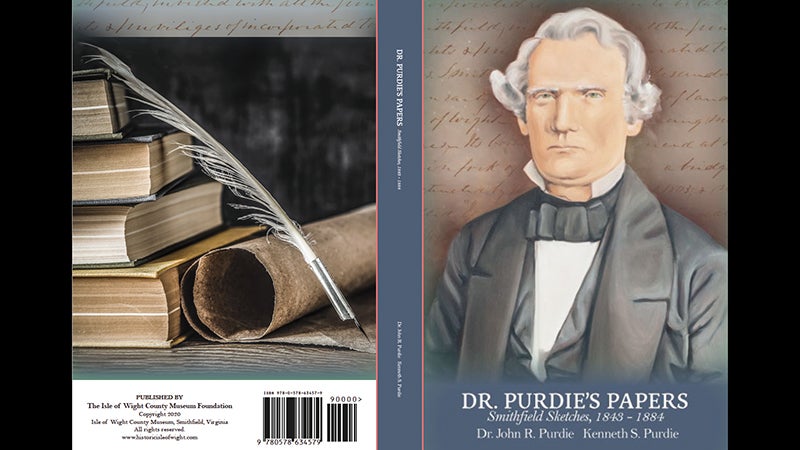IW Museum Foundation publishes ‘Dr. Purdie’s Papers’
Published 5:28 pm Tuesday, January 12, 2021

- The cover of “Dr. Purdie’s Papers” features a portrait of Purdie that hangs in the Windsor Masonic Lodge.
In 1853, Dr. John Robinson Purdie of Smithfield charged N.P. Young $2.50 for a house call on May 22.
“Leeching Sallie” cost another $2.50.
In 1855, Purdie offered Henry Wall $400 per year on behalf of his fellow vestry members if Wall would move to Smithfield and become the new rector of Christ Church. To this, Wall replied he had been “left the charge of two little motherless children” living in Ireland with their grandparents, at least one of whom he hoped to bring to the United States, which would “entail additional expense upon me.”
By 1858, it appears Christ Church was in the process of recruiting yet another new rector — one P.G. Robert — who inquired of Dr. Purdie as to the size of the cooking stove in the parsonage.
“I have a stove which I have been using for some six or eight months, that I intended carrying with me until I saw you had listed one,” Robert wrote.” As I find the size of mine to be just suited for my family use, it would be more convenient to retain it, if the one at the parsonage is much smaller.”
It’s minutiae such as this, glimpses into the day-to-day life in 19th century Isle of Wight County, that Doris Gwaltney — a relative of Purdie who still lives in Smithfield — finds so fascinating about the letters and journals her great-uncle left behind, which are now transcribed in “Dr. Purdie’s Papers: Smithfield Sketches, 1843-1884” a book published in December 2020 as fundraiser for the Isle of Wight County Museum.
“A particularly interesting tidbit concerns Thomas Jefferson,” Gwaltney writes in the book’s foreword. “In a memorandum about the candidates for the office of Surveyor of Smithfield, Jefferson wrote about Dr. John H. Purdie: ‘His father I know. He is a good man.’ From this we discover that Thomas Jefferson and George Purdie, father of Dr. John H. Purdie who was Dr. John R.’s father, knew each other.”
Gwaltney — the author of two historical fiction novels: “Shakespeare’s Sister” and “Duncan Browdie, Gent” — inherited John R. Purdie’s papers upon the death of her cousin, Kenneth Sinclair Purdie, in 1983.
Kenneth, whose Daily Press obituary identifies him as the last of the Smithfield Purdies to bear the family name, had already transcribed a number of his grandfather’s letters and journals. The museum staff, Gwaltney said, were the ones who physically did the remainder of the work.
The letters had “been sitting around for quite a while,” Gwaltney admits, though she said she “always wanted to do something” to get them published.
One morning, she had gone to the Isle of Wight museum and started talking to the staff there about the letters her cousin had saved and preserved. She described the folks at the museum as being “very interested” in the idea of printing the collection in a book.
“It truly, in many ways, was what the title of this book says it is: they were Dr. Purdie’s papers, saved by him during his lifetime,” Gwaltney said.
Included in the collection are correspondence between Purdie and William Meade, who served as presiding bishop of the Confederate Church during the Civil War, and “other clergy, vestry and churchmen who had problems they believed Dr. Purdie could solve,” Gwaltney said.
In addition to his work as a physician, Purdie served as mayor of Smithfield from 1863-1866 and was a member of Masonic Lodge No. 170 A.F. & A.M. in Windsor. In fact, the image on the book’s cover is a portrait of Purdie, which hangs in Windsor’s Masonic Lodge.
“Back in those days … people did not go to a doctor unless they were practically dying,” Gwaltney said. As such, they had much more time for “all sorts of interesting pursuits.”
“This project has been a labor of love,” said Jennifer England, director of the Isle of Wight County Museum.
The book is available for purchase in the museum’s gift shop for $28.95. The publication is a verbatim copy of Dr. Purdie’s journals, and as such, spelling, grammar, punctuation and syntax have not been corrected. All of the proceeds from sales will go toward the museum.




